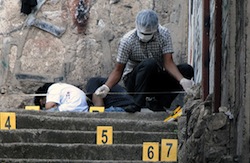A new study revealed that only one percent of homicide cases in Honduras’ three major cities ever resulted in convictions, underscoring the rampant impunity fostered by the country’s dysfunctional criminal justice system.
A study conducted by the Alliance for Peace and Justice (APJ), a Honduran NGO, examined 566 homicide cases in the cities of San Pedro Sula, Comayagua and Tegucigalpa, and found that only one percent resulted in convictions, reported Revistazo. The APJ identified the state’s inability to carry out quality criminal investigations as the main reason for the lack of convictions, and revealed that evidence — including the body of the victim — was collected at the crime scene in only 61 percent of these cases. In addition, criminal investigations were only opened in 8 percent of the cases and only 7 percent ever made it to trial.
At a national level, the APJ found that of the 27,272 homicides that occurred between 2010 and 2013, just 1,009 — or 3.7 percent — resulted in convictions.
Iris Fonseca, the Special Prosecutor for Homicides in Honduras, told Revistazo that 2,363 homicides have been registered so far this year in the cities of San Pedro Sula and Tegucigalpa, but only 129 homicide cases have gone to court.
InSight Crime Analysis
The APJ study underscores the high level of impunity in Honduras facilitated by corruption, lack of training, and an overwhelmed judicial system. According to the figures revealed by the APJ, Honduras’ impunity rate for homicides is over 96 percent, which means that there is practically no disincentive for criminal groups — like the country’s powerful street gangs — to commit murders. Rampant impunity is likely one factor contributing to San Pedro Sula’s status as the world’s most violent city, and Tegucigalpa’s position within the top ten.
SEE ALSO: Honduras News and Profiles
While Honduras has made strides this year in going after powerful drug trafficking groups like the Valle Valle clan, these successes have arguably done little in the short term to improve daily life for Honduran civilians. APJ’s findings suggest the country might be better served by investing more resources in strengthening the institutions responsible for the collection of evidence and criminal investigation, rather than focusing its efforts on high-profile captures and extraditions.

